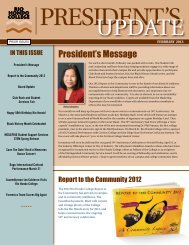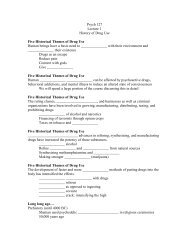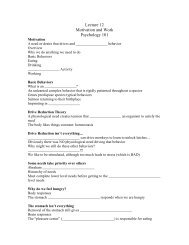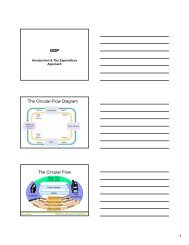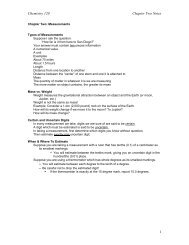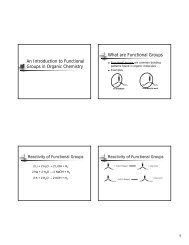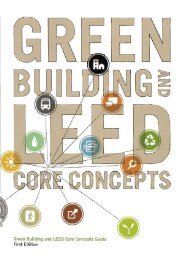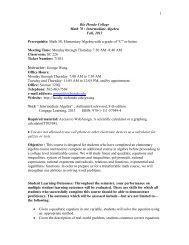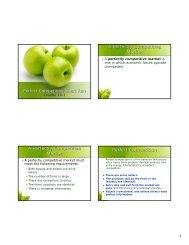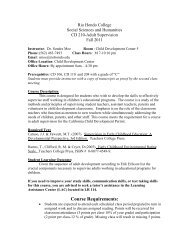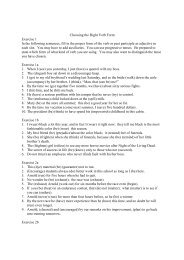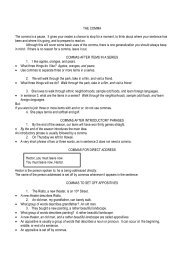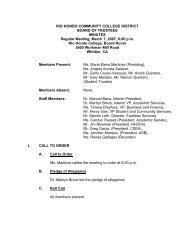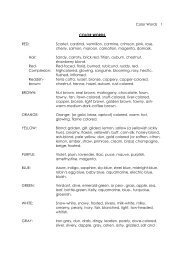Complete College Catalog 2011-2012 - Rio Hondo College
Complete College Catalog 2011-2012 - Rio Hondo College
Complete College Catalog 2011-2012 - Rio Hondo College
You also want an ePaper? Increase the reach of your titles
YUMPU automatically turns print PDFs into web optimized ePapers that Google loves.
BIOL 111L<br />
Marine Biology Laboratory<br />
Prerequisite/Corequisite: BIOL 111<br />
Advisory: ENGL 035 or ESL 198 or<br />
appropriate assessment; READ 023 or<br />
appropriate assessment; MATH 050 or<br />
appropriate assessment<br />
Transfers to: UC, CSU<br />
This laboratory course complements<br />
the Marine Biology lecture course and<br />
is designed for the student interested in<br />
furthering their understanding of the<br />
marine environment and its organisms,<br />
with emphasis on marine life of the<br />
local coasts. The scientific method will<br />
be employed to investigate the chemical<br />
and physical properties of seawater,<br />
the role of pigments in marine algae,<br />
the behavior of marine organisms, the<br />
basic classification and morphology<br />
of marine producers, invertebrates<br />
and vertebrates, and adaptations of<br />
organisms to specific habitats. Students<br />
will use basic laboratory equipment<br />
and techniques in both classroom and<br />
field-based investigations. Field trips<br />
to coastal marine habitats and public<br />
aquaria are conducted.<br />
1 Unit<br />
54 Lab hours<br />
BIOL 112<br />
Outdoor Biology<br />
Advisory: ENGL 030 or ESL 027 or<br />
appropriate assessment; READ 022 or<br />
appropriate assessment; MATH 030 or<br />
appropriate assessment<br />
Transfers to: UC, CSU<br />
This course emphasizes the natural<br />
world and the ecological relationships<br />
of the organisms found within it. The<br />
course also emphasizes the natural<br />
habitats of Southern California and<br />
the plants and animals associated<br />
with them. The impact people have<br />
had upon these natural habitats is also<br />
discussed. Students utilize the <strong>Rio</strong><br />
<strong>Hondo</strong> <strong>College</strong> Wildlife Sanctuary to<br />
gather original data through firsthand<br />
observation, experiences, and with the<br />
use of scientific methodology.<br />
3 Units<br />
36 Lecture hours<br />
54 Lab hours<br />
BIOL 115<br />
Introduction to Entomology<br />
Advisory: ENGL 035 or ESL 198 or<br />
appropriate assessment; READ 022 or<br />
appropriate assessment; MATH 030 or<br />
appropriate assessment<br />
Transfers to: UC, CSU<br />
This is a survey course in insect biology<br />
with an emphasis on recognition and<br />
identification of common, locally<br />
occurring, and pest species. The course<br />
covers insect structure; classification,<br />
with an emphasis on important<br />
families; economic importance; insect<br />
ecology and insect control. Laboratory<br />
time and limited field work will be<br />
spent in collection; preparation and<br />
identification of specimens. The course<br />
is recommended for students wishing to<br />
study insects and related animals. The<br />
course will also serve to train employees<br />
of local agencies including agriculture<br />
departments and vector control districts.<br />
4 Units<br />
36 Lecture hours<br />
108 Lab hours<br />
BIOL 120<br />
Environmental Biology<br />
Advisory: ENGL 101; READ 023 or<br />
appropriate assessment; MATH 050 or<br />
appropriate assessment<br />
Transfers to: UC, CSU<br />
Utilizing basic biological concepts,<br />
an interdisciplinary approach is<br />
used to address environmental<br />
challenges. Topics addressed may<br />
include ecosystem characteristics<br />
and functions, population dynamics,<br />
energy and material resource use,<br />
pollution, and alternative energy<br />
sources. Students in many disciplines<br />
will benefit from this course as<br />
the social, political, and economic<br />
implications of environmental<br />
decisions are addressed. This<br />
course fulfills the general education<br />
requirement in life sciences.<br />
3 Units<br />
54 Lecture hours<br />
BIOL 120L<br />
Environmental Biology Laboratory<br />
Prerequisite/Corequisite: BIOL 120<br />
Advisory: ENGL 035 or ESL 198 or<br />
appropriate assessment; READ 023 or<br />
appropriate assessment; MATH 030 or<br />
appropriate assessment<br />
Transfers to: UC, CSU<br />
This laboratory course compliments<br />
the Environmental Biology lecture<br />
course and is designed for students<br />
interested in furthering their<br />
understanding of the environmental<br />
sciences. The scientific method will be<br />
employed to investigate ecosystems<br />
and their functions, natural selection,<br />
population interactions, environmental<br />
toxicology, radiation exposure effects,<br />
soil and groundwater systems, water<br />
pollution, alternative energy systems,<br />
and environmental resistance.<br />
1 Unit<br />
54 Lab hours<br />
BIOL 125<br />
Human Anatomy<br />
Advisory: ENGL 035 or ESL 198 or<br />
appropriate assessment; READ 023 or<br />
appropriate assessment; MATH 050 or<br />
appropriate assessment; BIOL 101<br />
Transfers to: UC, CSU<br />
This course is primarily a systems<br />
approach to the study of human<br />
body structure. The study of each<br />
body system includes structural<br />
specializations and functions from<br />
the microscopic to the system level<br />
emphasizing the interdependence<br />
of form and function. Additional<br />
topics include methods of<br />
anatomical study, human genetics,<br />
and embryonic development. The<br />
laboratory exercises will also include<br />
vertebrate dissections. This course is<br />
intended for students preparing to<br />
enter careers in the health sciences.<br />
4 Units<br />
54 Lecture hours<br />
54 Lab hours<br />
BIOL 200<br />
Principles of Biology 1 (Molecular<br />
and Cellular Biology)<br />
Prerequisite/Corequisite: HS Chemistry<br />
with a grade of “C” or better or CHEM<br />
120 and MATH 070 or appropriate<br />
assessment<br />
Advisory: ENGL 035 or ESL 198 or<br />
appropriate assessment; READ 023 or<br />
appropriate assessment<br />
Transfers to: UC (credit limit*), CSU<br />
(*Students will receive credit from UC<br />
for only one of the following courses:<br />
BIOL 101 or BIOL 200)<br />
This course is first in a sequence of<br />
courses for undergraduate preparation<br />
for biology majors. Areas of focus<br />
include cellular and molecular<br />
biology, bioenergetics, genetics,<br />
evolution and ecology. The laboratory<br />
portion of the course emphasizes<br />
scientific methodologies focusing<br />
on observations, experimentation,<br />
record keeping, data collection and<br />
analysis, and presentation of outcomes.<br />
The course sequence also provides<br />
excellent preparation for those students<br />
intending to pursue post-graduate<br />
studies in the medical sciences.<br />
5 Units<br />
54 Lecture hours<br />
108 Lab hours<br />
BIOL 201<br />
Principles of Biology 2 (Diversity and<br />
Ecology)<br />
Prerequisite: BIOL 200<br />
Advisory: ENGL 035 or ESL 198 or<br />
appropriate assessment; READ 023 or<br />
appropriate assessment<br />
Transfers to: UC, CSU<br />
This course continues the sequence<br />
of undergraduate preparation for<br />
biology majors. The course is a<br />
survey of the diversity of life on earth,<br />
focusing on the relationships between<br />
structure and function. Topics deal<br />
with classification, development,<br />
evolutionary relationships and<br />
ecological functions of living<br />
organisms. Laboratories will<br />
emphasize life forms, experimentation<br />
and dissections. Field trips will be<br />
used to examine organisms in their<br />
natural settings.<br />
5 Units<br />
54 Lecture hours<br />
108 Lab hours<br />
BIOL 203<br />
Principles of Zoology<br />
Prerequisite: 1.) BIOL 200 or 2.)<br />
BIOL 101, MATH 070 or appropriate<br />
assessment, and CHEM 130<br />
Advisory: ENGL 035 or ESL 198 or<br />
appropriate assessment; READ 023 or<br />
appropriate assessment<br />
Transfers to: UC, CSU<br />
This course surveys the animal-like<br />
protists and the major animal groups.<br />
<strong>2011</strong>-<strong>2012</strong> <strong>Catalog</strong> <strong>Rio</strong> <strong>Hondo</strong> <strong>College</strong> / 151



